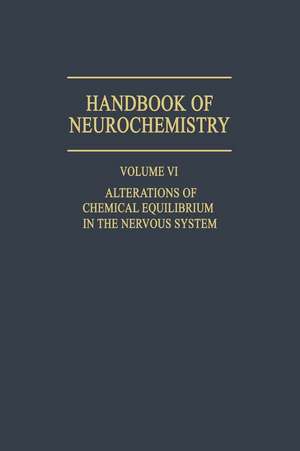Alterations of Chemical Equilibrium in the Nervous System
Autor Abel Lajthaen Limba Engleză Paperback – 16 feb 2013
Preț: 654.30 lei
Preț vechi: 769.77 lei
-15% Nou
Puncte Express: 981
Preț estimativ în valută:
125.20€ • 133.88$ • 104.39£
125.20€ • 133.88$ • 104.39£
Carte tipărită la comandă
Livrare economică 17 aprilie-01 mai
Preluare comenzi: 021 569.72.76
Specificații
ISBN-13: 9781461571773
ISBN-10: 1461571774
Pagini: 608
Ilustrații: XXI, 584 p. 8 illus.
Dimensiuni: 152 x 229 x 32 mm
Greutate: 0.8 kg
Ediția:Softcover reprint of the original 1st ed. 1971
Editura: Springer Us
Colecția Springer
Locul publicării:New York, NY, United States
ISBN-10: 1461571774
Pagini: 608
Ilustrații: XXI, 584 p. 8 illus.
Dimensiuni: 152 x 229 x 32 mm
Greutate: 0.8 kg
Ediția:Softcover reprint of the original 1st ed. 1971
Editura: Springer Us
Colecția Springer
Locul publicării:New York, NY, United States
Public țintă
ResearchCuprins
Chapter1 Chemosensory Stimulation.- Chapter2 Excitation.- Chapter3 Some Neurochemical Aspects of Convulsions.- Chapter4 Stress.- Chapter5 Chemical Alterations Produced in Brain by Environment and Training.- Chapter6 Memory.- Chapter7 Do Specific Biochemical Correlates to Learning Processes Exist in Brain Cells?.- Chapter8 Chemical Transfer of Information.- Chapter9 Undernutrition and the Developing Brain.- Chapter10 Effect of Ischemia.- Chapter11 Body Temperature and Drug Effects.- 12 Phenothiazines: Neurochemical Aspects of Their Mode of Action.- Chapter13 Reserpine: A Survey of Its Pharmacology.- Chapter14 Antidepressants and Related Drugs.- Chapter15 Lithium.- Chapter16 Anesthetics.- Chapter17 Local Anesthetics.- Chapter18 Hallucinogens.- Chapter19 Demyelinating Cholinesterase Inhibitors: Lipid and Protein Metabolism.- 20 The Alteration of Brain Metabolism by Narcotic Analgesic Drugs.- Chapter21 Alcohol.- Chapter22 Effects of Ionizing Radiation.
















